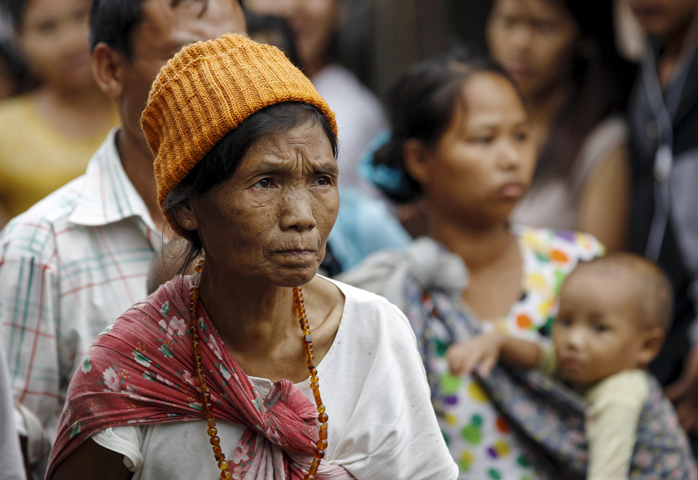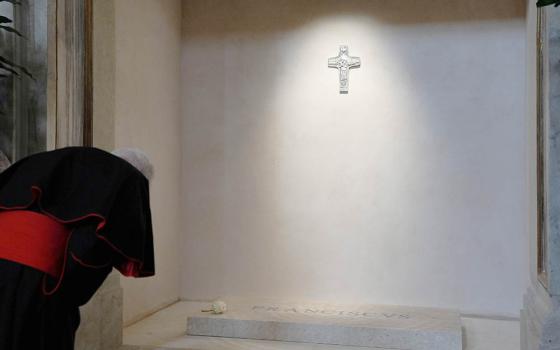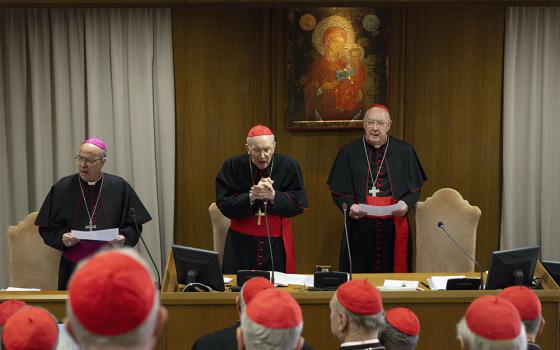
Ethnic Kachin refugees gather July 31 at a camp in Myitkyina, Myanmar. (CNS /Soe Zeya Tun, Reuters)
Displaced members of Myanmar's Kachin ethnic minority are struggling with being away from their homes and the limited services available in a Catholic-run camp near the Myanmar-China border, said the chairman of the U.S. bishops' Committee on Migration.
After visiting the camp in the Myitkyina Diocese in northern Myanmar Aug. 6, Auxiliary Bishop Eusebio Elizondo of Seattle told Catholic News Service people asked for better health care services and education for their children.
"The food, they were very happy with that," Elizondo said in an interview from Yangon, Myanmar's capital. "They live in huts made with bamboo and wood. It's very poor. A family of five or six is living in a little space. They have pure water. However, the conditions are very poor."
The 400 people in the camp operated by Caritas Myanmar are among thousands of Kachin people who have been displaced by years of fighting between a Kachin-led independence movement and the Myanmar military.
The Kachin live in northernmost Myanmar and neighboring areas of China and India. More than 90 percent of the Kachin identify themselves as Christian.
Camp occupants wanted peace in their homelands so they could return home, he said.
"It's not the best conditions for these people, but they are grateful that someone is helping them and giving them the opportunity they need," he said.
Work opportunities are limited for the displaced Kachin, and some have turned to buying basic supplies and reselling them to camp residents, he said.
Elizondo is part of a contingent from the U.S. Conference of Catholic Bishops on a three-week trip to Myanmar, Thailand, Malaysia and Indonesia. The group includes two members of the USCCB policy staff and a representative of the bishops' Migration and Refugee Services department. They were exploring the trafficking of minority ethnic people for sex and labor and the situation of unaccompanied children migrating throughout the region.
The trip was meant as a way to demonstrate support for people who often have been pushed to the margins of society, including the Rohingya Muslim minority, who have been denied recognition by the Myanmar government and the Chin ethnic minority.
Late Aug. 6, Elizondo shared dinner with Cardinal Charles Bo of Yangon at which the struggles of ethnic minorities were discussed.
"We were stating, of course, that we are very much concerned about the luck of our brothers and sisters who are very much in disarray having to leave their country and coming to the United States looking for a better life because they are in danger in their own country for many reasons," the bishop said.
"We were talking about the importance of the support of Migration and Refugee Services, especially on this issue of the refugees and migrants and all the internally displaced people. They are very grateful and happy that we are helping with these issues," he told CNS of the service offered through Caritas, known as Karuna Myanmar Social Services.
The USCCB trip comes as the Southeast Asian nation is preparing for general elections Nov. 8.
Long a military dictatorship, Myanmar began transitioning to more democratic governance in 2010 with the election of a civilian government headed by President Thein Sein, who has instituted political and economic reforms that have resulted in the opening of the long-closed country.
The elections hold the key to the future, and many aid agencies and church groups were awaiting their outcome, Elizondo said.
The Myanmar government was confronting its own struggles in responding to monsoon rains that have caused flooding in four parts of the country. Officials said Aug. 6 that 74 people have died and more than 330,000 were affected by the flooding.
The government has appealed for international aid.
"This is not a country with a good infrastructure with roads and communications," Elizondo said. "It's very complicated to reach certain areas. But the church is very active in that front. People are working for donations and collecting clothing food to help all these people in distress."
Bishop Oscar Cantu of Las Cruces, New Mexico, chairman of the bishops' Committee on International Justice and Peace, was to meet the contingent Aug. 10 in Malaysia after participating in observances in Japan marking the 70th anniversary of the atomic bombings of Hiroshima and Nagasaki.



